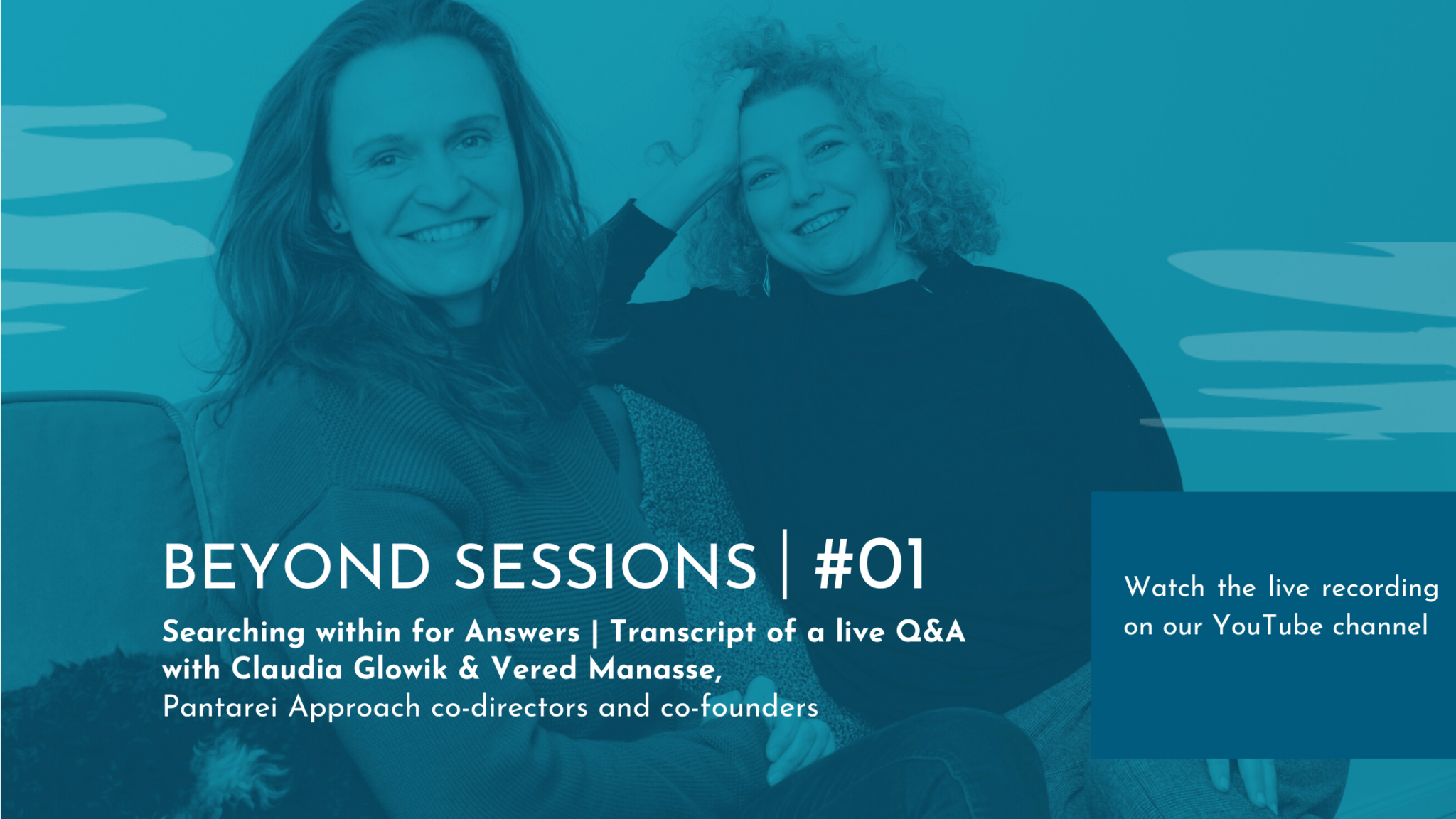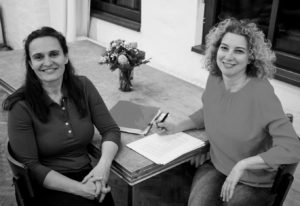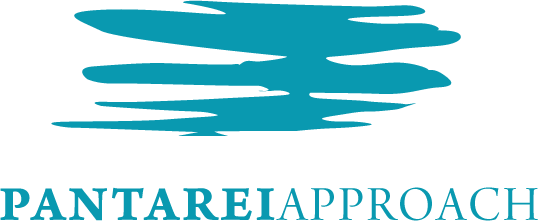
Beyond Sessions – “Searching within for Answers” | a live Q&A with Claudia & Vered
We have just started a Beyond Sessions interview series in collaboration with Megan Lillick, our program host. In this first interview of the series: “Searching within for Answers” we explore our experiences in holding the Pantarei vision.
Below is a transcript based on our interview and we also welcome you to watch the live recording on our YouTube channel.
Megan:
Welcome to Beyond Sessions, a live, interactive conversation designed to showcase Pantarei Approach insights in real-world situations. I’m Megan Lillick, a graduate of the Pantarei Approach School, and today, I’ll be speaking with co-directors and co-founders of the school, Claudia Glowik, and Vered Manasse.
Although I’ve got some topics I’m hoping we’ll cover, in true Pantarei fashion, I know that anything and everything can come up — so we will go with the flow, spending about 30 minutes tapping into the resources, energy, and strengths of our interviewees. We’ll even try to cover some of your questions at the end. Feel free to add them and any comments in the chatbox throughout the event and we’ll circle back to them during this allotted time for the audience Q&A.
So without further ado, let’s begin.
Question:
First off, thank you both for joining us today for our first BEYOND SESSIONS conversation. I’d like to start out by helping our listeners (particularly those who aren’t familiar with the school) to understand the fundamentals of the Pantarei Approach. If you had to describe the approach and why you’ve developed it in, say, three sentences, how would you do that?
Claudia’s Answer:
From over 25 years of experience working with clients and giving workshops on self-development and healing, we have come to the conclusion that the answers to what a person needs in order to change, handle their difficulties, or heal and recover are most often found within. We know what we need if we have the confidence within, and are given the space in which to explore our questions. The Pantarei Approach connects people to their own inner wisdom and gives them access to how to use it, through a combination of verbal communication and touch, in order to engage all aspects of our human experience.
Vered’s answer:
The Pantarei Approach is a way to harness the inner wisdom that we each have about our own lives; our history, what we are going through in the present moment, and what we wish for in our future.
It is a bodywork-based modality that invites us on a journey to explore our uniqueness and to appreciate and use all that we are regardless of our struggles or successes. When we get in touch with our individual pallet of qualities, emotions, expressions, and experiences, we connect to our tailor-made path in life.
Question:
Why did you develop the Pantarei Approach?
Answer:
At the time of developing it, we had already accumulated 50 years of experience as somatic practitioners and teachers.
We founded Pantarei, at a time in which we realized that we no longer identified with teaching any methodology that puts the emphasis on clients’ problems, thus focusing on forces such as fear and pain. Instead, we were moved to bring attention to the strengths and unique qualities we see in people and to connect them to their individual resources, especially in times when they struggle to connect to these themselves.
Question:
Huge publications like Forbes have dubbed 2022 the year you should hire a coach. As an athlete myself, the idea of a coach appeals to me, but I know not everyone will feel as familiar with it. However, particularly in the past few years, we’ve had to reckon with the need to navigate a sea of change. From the push for sustainability to post-pandemic career pivots to feeling bombarded by negative news cycles, how can life coaching help individuals in this era of “unprecedented opportunities”?
Claudia’s Answer:
We need to navigate through difficult and challenging times, like the pandemic, global warming, and a war in Europe, in addition to the personal challenges we face every day.
It is a very natural response to seek help and support. This shouldn’t even be a question. We are amazingly resourceful when it comes to being human and we are very adept at managing our challenges.
Having support does not take anything away from one’s ability to manage on one’s own, but rather, adds value to this process.
This point in particular I feel is not well understood in our society. Having support in all aspects of our life can make it better; easier.
When clients come to me, I see who is in front of me. I see who my client is. I perceive different things about the person, and I free myself of judgment and limitations by being truly interested in the person. I create a space to listen to them. I add to them, their wishes, their resources, and their confidence so that they can feel more strength and possibilities available to them to live and grow through whatever it is they are going through.
Vered’s Answer:
Dealing with crises in recent years from Covid to the conflict in Europe reminded us how little control we have over situations and circumstances. And therefore, it is not surprising that coaching has become more needed than ever before.
Learning who we are might be the most important learning a person can invest in, and therefore I am so happy that life coaching, in all its forms is getting the center stage.
If I know my abilities, I know how to better deal with life.
If I know how to deal with my emotions, I know how to better process situations that have had an impact on me.
If I know how to respect my intuition, I will find creative ways to navigate through ever-changing circumstances.
Going to a Pantarei practitioner might seem like somewhat of a privilege for some. Still, I would say that if people made it a habit to take care of themselves, everything they do and touch would be way more productive and pleasurable. We would benefit, not only as individuals but as a society.
Question:
So, a key mission of the Pantarei Approach is to make the world a better place — and the more people who know about the approach, the better. What sets Pantarei apart from other life coach philosophies? And how can the Pantarei Approach support the big issues of our time — even across cultural, geographical, and generational boundaries?
Claudia’s answer:
I believe the world needs compassion and connection in order to heal and grow.
The name Pantarei is ancient Greek and means “everything flows”. It comes from the Greek philosopher Heraclitus that uses the saying, that “no man steps into the river twice – as the man will not be the same nor the river.” Besides the strong image here that everything flows, you can also hear in the man and the river that “everything is connected”.
In the Pantarei Approach we connect our clients with themselves; their inner wisdom, thoughts, emotions, and life story.
We remind people that there is only one like them, there is no need to compare to others and try to be like them, there is just one person that they can be like and that’s themselves.
Noticing this allows us to notice the same in others, thus improving our connection and compassion.
If a person is connected to themselves, they can also experience that they are not alone in the world. They are not isolated but rather, part of something bigger.
It develops our empathy in order to notice others, to understand them, to see them not as a threat but as different and maybe interesting.
Understanding and experiencing that we are part of the world, a society that we are part of allows a person to care, to build, and form a future together.
Vered’s answer:
We use a combination of touch and verbal communication. For us, touch is a way of communicating directly with our clients’ emotional and energetic world. There is so much inner wisdom in each of us if we know how to listen to it, and a Pantarei practitioner intends to explore that wisdom with their clients.
The Pantarei Approach is not a list of rules, guidelines, or a set of morals. Nor is it a recipe for living. We do not claim to be experts on people or people’s experiences, and the Approach doesn’t offer a dogma to which people should aspire. We believe that the most qualified guide to each of us lies within the person.
Question:
Vered, you’ve talked before about how our pasts are treasures that — if not ignored — can empower people to define an authentic path for the life they wish to live. You even specialize in trauma. Why do you think that’s so important in today’s world?
One of the reasons for many conflicts – both personal and those on bigger scales – has to do with old trauma that people haven’t yet dealt with. Therefore, dealing with our history is crucial in any society and as individuals.
Clearly, we cannot change the past, and whatever happened, happened. Our job, therefore, is to find a way to relate to it in the best way possible.
Pantarei focuses on the individual and their uniqueness. The difficulties people have been through expose some of their spirit, their strength, and the meaning they give to life.
People are so much stronger than what they often perceive, and when I encounter a client who has been through trauma, I feel honored to remind them of their strength and to connect them to the bigger picture of their lives, where they can be free from the fate that the traumatic story has shaped for them. I feel honored to remind my clients of their true nature, their values, and the meaning they give to life.
We find our strength when we manage to process the pain, fear, or horror of past events. Like in Leonard Cohen’s lyrics, there is a crack in everything. That is how the light gets in.
Our job is to find the light and decide how to navigate it through the cracks.
Question:
Claudia, your background in both somatic bodywork and — interestingly — as a stonemason at a graveyard has given you extensive experience when it comes to thinking about grief, death, and mortality. As I’m getting a bit older now, I find that many of my friends and I are dealing with health issues (both chronic and otherwise) that we kinda think, “Oh, we’re too young for this!” How can Pantarei help support the whole mind-body health?
It’s funny that when it comes to physical ailments we often say that we are too young for those, but when it is in regards to emotional outbursts, well, then we are too old for those. But in reality, there is no age at which we are safe from physical conditions or emotional challenges.
The Pantarei Approach is a somatic approach. We look at the person as a whole and if a client comes who struggles with a physical symptom I would look at all aspects of their life and how can I support this person. I don’t look at trying to fix their lower back pain, but rather I investigate which strengths they can tap into. What do they know they need in order for the back pain to heal?
You would be surprised by the answers that arise. Sometimes things improve with the addition of some physical therapy but often a lot is based in the field of emotions, in which clients need to learn how to better deal with their anxiety or other challenges that are connected to their pain. In order for us to be healthy, we need to find a balance between our emotional world, our mind, body, and soul. Ideally, they are in sync. So wherever there is a dissonance, I can place my hand, give space to emotions that were not experienced in relation to that place, or support my client to breathe more deeply. We are everything of who we are, not a separate machine whose parts work together. I have my touch, my words, and my attention to remind the person that everything is connected both within and around them.
Question:
Before we wrap things up, I just wanted to ask one more question. And that’s because I’ve heard that you’re both working on a book! So, in addition to teaching and welcoming applicants to the next class, which will start in September, you’ve been putting your heads together trying to bring Pantarei wisdom to a wider audience. What sort of topics will the book cover, and when can we expect to see it on the shelves?
Vered’s answer:
The book will describe what we teach in our training program. Although the training is physical and we keep it as something that happens in person rather than online, we believe that many people can benefit from what we teach even if they don’t join our practitioner training program.
The book will describe the philosophy of the Pantarei Approach and will include client stories and some exercises.
About the when: I wish I could tell you. The first draft is ready, but this doesn’t mean that the book is ready. If you had asked me two years ago, I would have said that it was only a matter of a few months. However, I want to believe that sometime in 2022- 2023, the first Pantarei book will be published.
We hope you enjoyed the first interview of our Beyond Sessions series and that it has left you feeling invigorated, energized, and ready to incorporate these tidbits of wisdom into your daily life.
If you have any questions or comments, reach out to us on our social media channels: LinkedIn, Facebook, Instagram, and YouTube, and stay tuned for more.

Interview of Claudia Glowik and Vered Manasse


